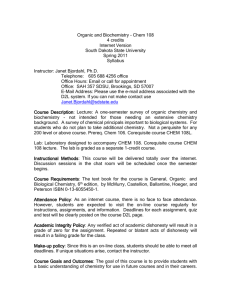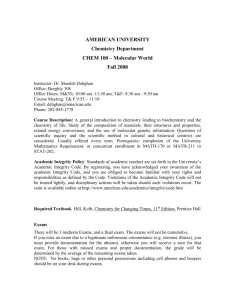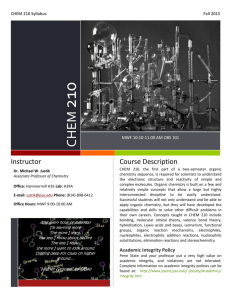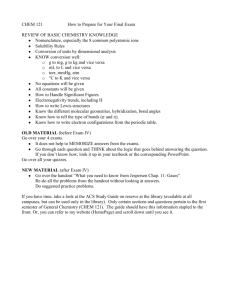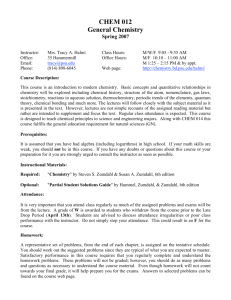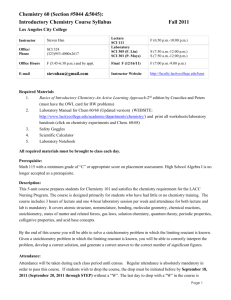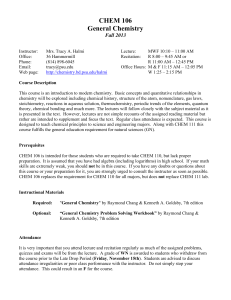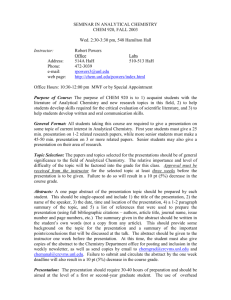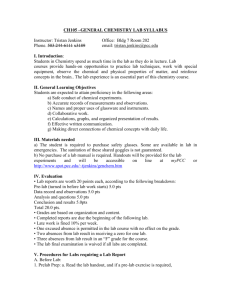Chemistry 112 Syllabus
advertisement
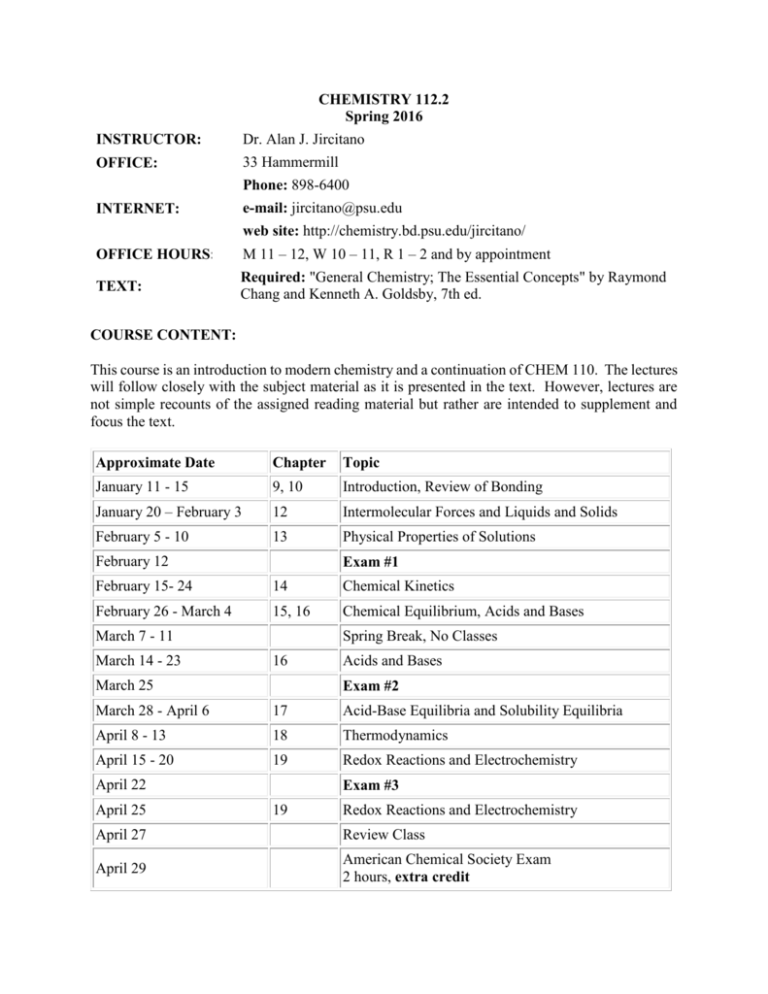
INSTRUCTOR: CHEMISTRY 112.2 Spring 2016 Dr. Alan J. Jircitano OFFICE: 33 Hammermill Phone: 898-6400 e-mail: jircitano@psu.edu INTERNET: web site: http://chemistry.bd.psu.edu/jircitano/ OFFICE HOURS: M 11 – 12, W 10 – 11, R 1 – 2 and by appointment TEXT: Required: "General Chemistry; The Essential Concepts" by Raymond Chang and Kenneth A. Goldsby, 7th ed. COURSE CONTENT: This course is an introduction to modern chemistry and a continuation of CHEM 110. The lectures will follow closely with the subject material as it is presented in the text. However, lectures are not simple recounts of the assigned reading material but rather are intended to supplement and focus the text. Approximate Date Chapter Topic January 11 - 15 9, 10 Introduction, Review of Bonding January 20 – February 3 12 Intermolecular Forces and Liquids and Solids February 5 - 10 13 Physical Properties of Solutions February 12 Exam #1 February 15- 24 14 Chemical Kinetics February 26 - March 4 15, 16 Chemical Equilibrium, Acids and Bases March 7 - 11 March 14 - 23 Spring Break, No Classes 16 March 25 Acids and Bases Exam #2 March 28 - April 6 17 Acid-Base Equilibria and Solubility Equilibria April 8 - 13 18 Thermodynamics April 15 - 20 19 Redox Reactions and Electrochemistry April 22 April 25 Exam #3 19 Redox Reactions and Electrochemistry April 27 Review Class April 29 American Chemical Society Exam 2 hours, extra credit GRADING: There will be three (3) 100 point exams. The dates are Friday, February 12 (on material up to and including chapter 13); Friday, March 25 (on material up to and including chapter 16); and Friday, April 22 (on material up to and including chapter 19). They are short answer and problems. Partial credit is given only if you show your work. Points will be deducted for not including units and the correct number significant figures in your final answer. The American Chemical Society standardized General Chemistry exam will be given on May 1 as extra credit (25% of the number correct). This will be given during class time. You will be allowed to take the exam for extra credit only if you have turned in at least 35 of the daily problems. It is a 2-hour, comprehensive (Chem 110 and Chem 112), multiple-choice exam. If you get 53 (or more) correct (out of 70) (the 90th percentile), you will not have to take the regular course final exam. The regular final exam will be the same format as the first three exams, is worth 200 points, and is comprehensive (for the semester). The date will be announced in class. There will be one or more problems assigned at the beginning of each lecture. The Monday problem will be due at the beginning of the Wednesday lecture, the Wednesday problem will be due at the beginning of the Friday lecture, and the Friday problem will be due at the beginning of the Monday lecture. Turned in problems will consist of the original handout, with your name and date at the top. The complete worked out solution must always be given and final answers circled. They will be turned in to the proper folder before class starts. If you forget (or miss getting) the daily problem handout, you can pick one up in my office within one day. You can, and are encouraged to, work together in small groups. However, this does not mean that one person does the problem and the rest of the group copies it. If a number of problems are turned in with exactly the same work, in exactly the same format and, usually, wrong in the same way, all those papers will receive a score of zero. The daily problems will not be accepted early or late under any circumstances. They are graded as follows: Correct work and answer Correct answer, but incorrect significant figures Correct answer, but incorrect or missing units Not circling correct final numerical answers Attempted, but incorrect answer Not using original handout Showing work that is inappropriate for your answer Showing no work Turning the problem in at the end of class Not turned in or minimal effort Not picking up previous graded problem (if one turned in) 2 pts. 1.75 pt. 1.75 pt. 1.75 pt. 1 pt. 0 pts. 0 pts. 0 pts. 0 pts. 0 pts. 0 pts. The total possible points for these problems is 90 points. In addition, there will be 10 discretionary points based on attendance, class participation, completion of assignments, etc., for a classroom total of 100 points. There is a total of 600 possible points in this course. GRADES: A A– B+ B B– 558-600 540-557 522-539 498-521 480-497 100 - 93% 90 - 92% 87 - 89% 83 - 86% 80 - 82% C+ C D F 462-479 420-461 360-419 0-359 77 - 79% 70 - 76% 60 - 69% 0 - 59% POLICIES: 1. The course prerequisite is Chem 110 or Chem 106 (D or better). You will be dropped from this course if you have not completed these prerequisites unless you can demonstrate that you have taken a suitable substitute for the official prerequisite. 2. If you are lost or confused at any time, see me after class. Don't wait until the last week. 3. Class attendance, on time, is expected. Much of the daily problems and exams will be from the lecture. Students are advised to discuss attendance irregularities or poor class performance with the instructor. Do not simply stop your attendance. This could result in an F for the course. A grade of W is given to students who withdraw from the course prior to the Late Drop Period. 4. Makeup exams will only be given for legitimate absences officially recognized by Penn State University. No exceptions will be made to this. A student having a legitimate excuse for missing any of the three scheduled exams will be provided with a single make-up opportunity near the end of the semester. This make-up exam will cover the material of all exams. Individual make-ups following each exam will not be provided. It is the responsibility of the student to notify the instructor if an exam will be missed or immediately after missing the exam and to contact me by April 25 regarding scheduling the make-up exam. 5. A representative set of problems, from the end of each chapter, are listed at the end of this handout. You should work out the suggested problems since they are typical of what you are expected to master. Satisfactory performance in this course requires that you regularly complete and understand the homework problems. These problems will not be graded. Complete solutions to the problems are available on the web. 6. Check your psu email daily. Any announcements or daily problems corrections will be sent to the entire class email list. 7. As a courtesy to others and the instructor, turn off cell phones before class! Texting during class is also very strongly discouraged. No cell phones out during exams. 8. The standardized General Chemistry exam prepared by the American Chemical Society will be given on the last day as extra credit. It is a 2-hour, comprehensive (Chemistry 110 and Chemistry 112), multiple-choice exam. You will be allowed to take the exam for extra credit only if you have turned in at least 35 of the daily problems. 9. Unless otherwise stated, the internet is not to be used for any work pertaining to Chem 112. 10. Any grading issues, on any assignments, must be brought to my attention within one week of the assignment being returned. Not point adjustments will be made after this time period. 11. Instructors are asked (Senate rule 49-20) to provide a statement at the beginning of a course to "clarify the application of academic integrity to that course." The Senate Rule includes: Academic dishonesty includes, but is not limited to, cheating, plagiarizing, fabrication of information or citation, facilitating acts of academic dishonesty by others, having unauthorized possession of examinations, submitting work of another person or work previously used without informing the instructor, or tampering with the work of other students. Read Senate rule 49-20: www.psu.edu/ufs/policies/47-00.html#49-20 and Behrend academic integrity guidelines: www.pserie.psu.edu/faculty/academics/integrity.htm Any violation of academic integrity will receive academic and possibly disciplinary sanctions, including the possible awarding of an XF grade which is recorded on the transcript and states that failure of the course was due to an act of academic dishonesty. All acts of academic dishonesty are recorded so repeat offenders can be sanctioned accordingly. HOMEWORK: Chapter 9: 23, 29, 37, 41, 43, 51, 55, 61, 75, 95, 117 Chapter 10: 7, 10, 11, 17, 19, 21, 22, 65, 67, 69 Chapter 12: 7, 9, 13, 15, 31, 45, 71, 97, 111, 114, 127 Chapter 13: 15, 17, 21, 31, 35, 47, 49, 53, 55, 69, 71, 81, 85, 97, 112 Chapter 14: 13, 15, 17, 33, 37, 77, 81, 97, 99, 105, 117 Chapter 15: 7, 9, 13, 15, 17, 19, 31, 33, 35, 43, 49, 51, 87, 93, 105 Chapter 16: 3, 5, 7, 15, 17, 21, 23, 31, 35, 41, 45, 55, 73, 89, 95, 109 Chapter 17: 7, 9, 11, 13, 15, 21, 27, 33, 39, 43, 49, 50, 51, 79, 81, 83, 87, 93, 99, 105, 113, 117 Chapter 18: 9, 13, 14, 19, 23, 25, 31, 45, 59, 61, 95 Chapter 19: 1, 2, 11, 13, 15, 17, 29, 61 TUTORING HELP: Go to behrend.psu.edu/tutorappointments for tutoring appointments. SPECIAL NOTE: If you receive loans, grants, or work study to help pay for college, see the online syllabus.
